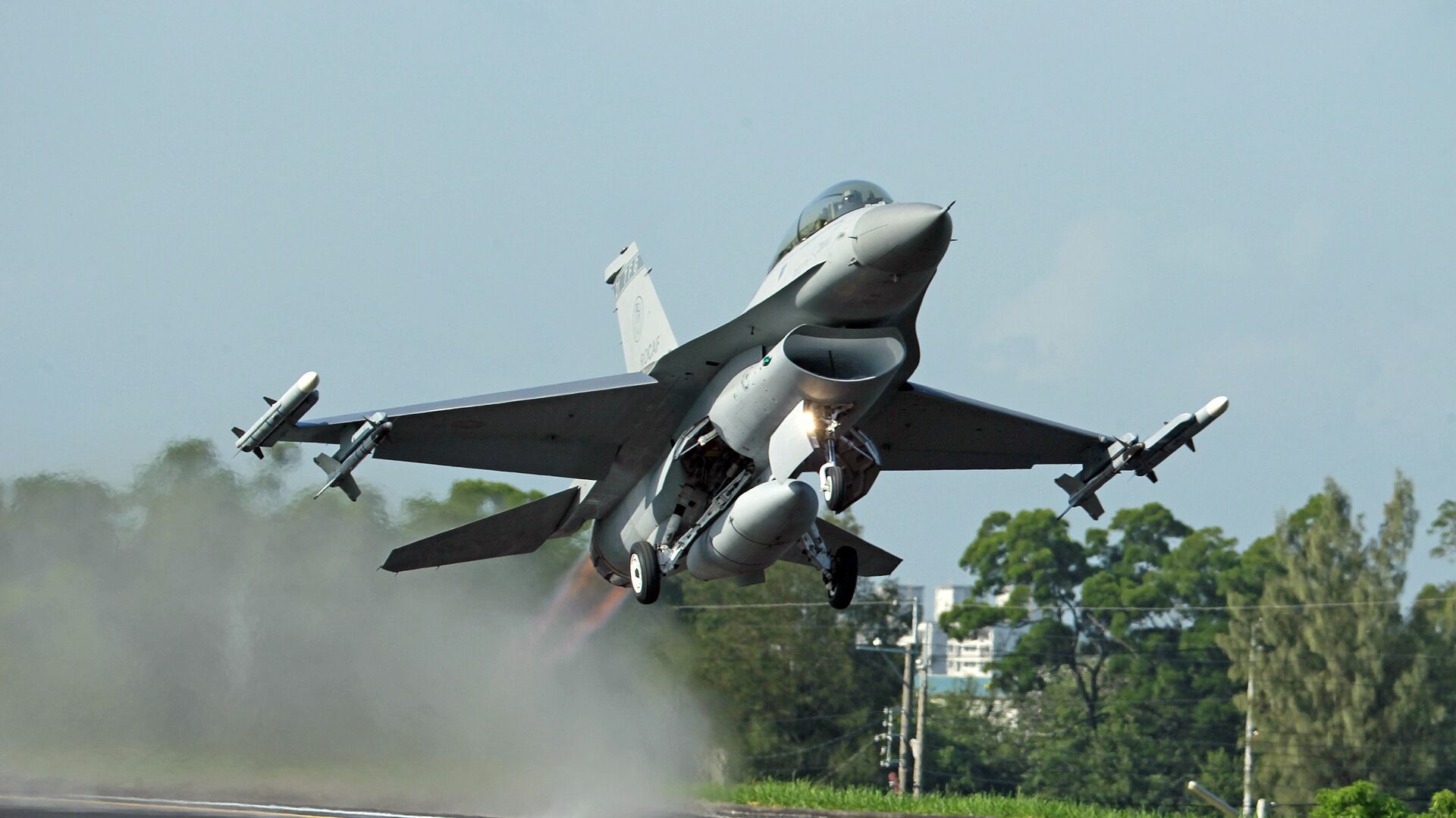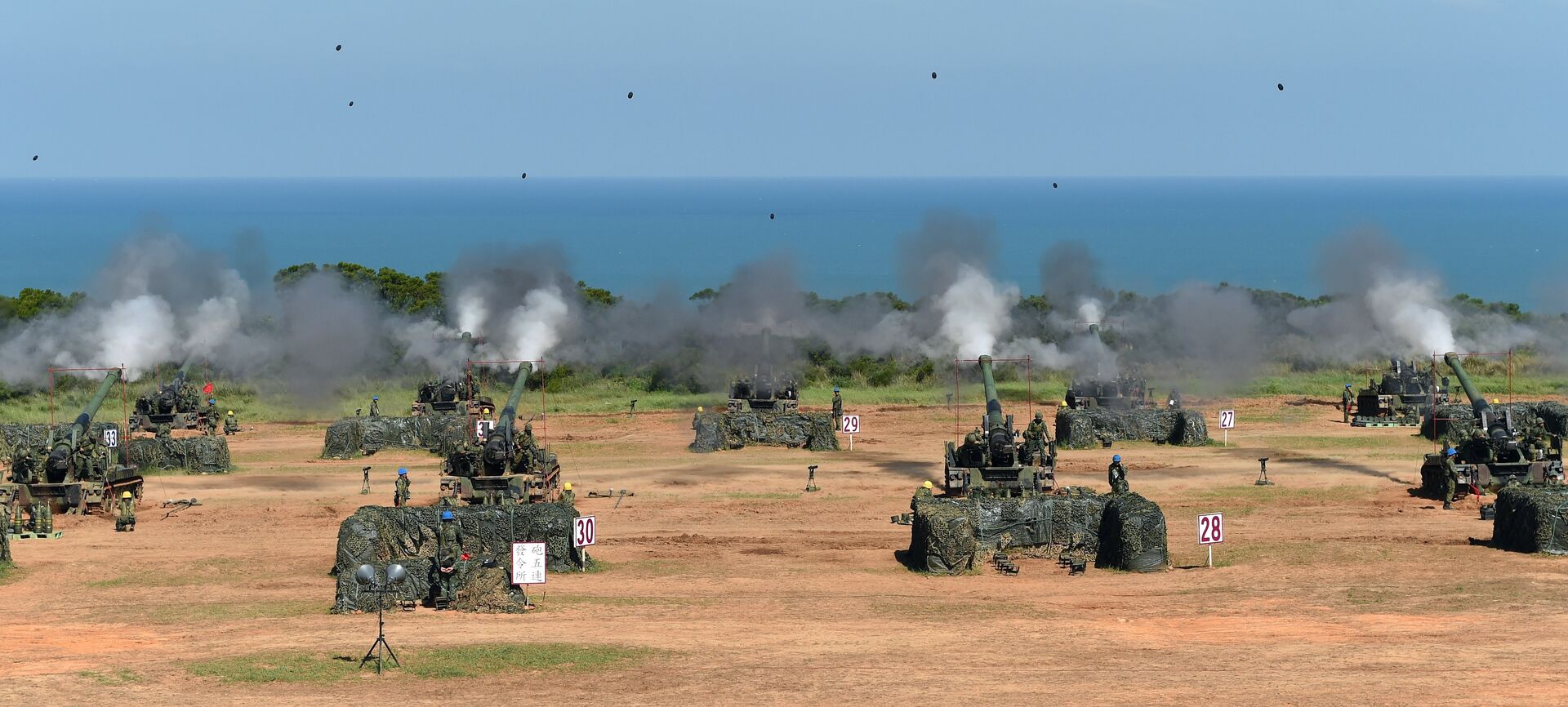https://sputnikglobe.com/20220523/biden-vows-military-response-from-us-if--china-invades-taiwan-1095710471.html
White House in Damage Control After Biden Vows Military Response if China Invades Taiwan
White House in Damage Control After Biden Vows Military Response if China Invades Taiwan
Sputnik International
The US president noted that Beijing is "flirting with danger" as tensions around Taiwan are escalating, warning China against attempts to seize the island by... 23.05.2022, Sputnik International
2022-05-23T06:08+0000
2022-05-23T06:08+0000
2023-06-19T12:43+0000
china
us
joe biden
taiwan
https://cdn1.img.sputnikglobe.com/img/107356/00/1073560036_0:0:4290:2413_1920x0_80_0_0_837ef25d496c4618db12c5c7c62405a3.jpg
Joe Biden addressed the issue of Taiwan during his meeting with Japanese Prime Minister Fumio Kishida, pledging to protect the island against any invasion.Addressing the president's statement, White House officials later said that Biden simply meant the US would provide military equipment to Taiwan, not send troops to defend the island, which would be a landmark shift in policy.In response to the statement, the Chinese foreign ministry called on the US to be careful when it comes to the Taiwan issue.This is not the first time Biden has confirmed that the US would defend Taiwan if it was attacked: last year, he also said that, while the White House stressed that the US won't change its policy regarding this matter.Tensions between China and the US have been brewing over the past months, amid growing deliveries of American weapons to Taipei.At the same time, China voiced protest over a number of US policies on the Taiwan issue: most recently, the US Department of State edited its website, omitting the phrase "the United States does not support Taiwan independence".In response, Beijing urged the US to "stop engaging in political manipulation", stressing "there is only one China in the world".Situation Around TaiwanTaiwan, which formally calls itself the "Republic of China", has been governed separately from the rest of the country since the end of the civil war in 1949. Beijing considers the island to be a part of the People's Republic of China, and while the US does not recognise Taiwan as an independent nation, Washington enjoys close relations with Taipei, delivering weapons and pledging to protect the island.Last month, however, US media suggested that American defence contractors had a backlog of $14.2 billion worth of military equipment that Taiwan bought back in 2019. According to the reports, less than 20 percent of the weaponry ordered has been delivered to Taipei due to "COVID-related acquisition issues".Addressing the backlog, Admiral Michael Gilday, chief of US Naval Operations urged Taiwan to boost its defence, citing a possible "aggression" by China in light of the crisis in Ukraine. It triggered a painful reaction in Beijing, with the Chinese foreign ministry saying that Taiwan was none of America’s business.
china
taiwan
Sputnik International
feedback@sputniknews.com
+74956456601
MIA „Rossiya Segodnya“
2022
Evgeny Mikhaylov
https://cdn1.img.sputnikglobe.com/img/07e4/09/07/1080390164_0:0:1440:1440_100x100_80_0_0_46c187f2ab0908f86849a7d09a7def57.jpg
Evgeny Mikhaylov
https://cdn1.img.sputnikglobe.com/img/07e4/09/07/1080390164_0:0:1440:1440_100x100_80_0_0_46c187f2ab0908f86849a7d09a7def57.jpg
News
en_EN
Sputnik International
feedback@sputniknews.com
+74956456601
MIA „Rossiya Segodnya“
Sputnik International
feedback@sputniknews.com
+74956456601
MIA „Rossiya Segodnya“
Evgeny Mikhaylov
https://cdn1.img.sputnikglobe.com/img/07e4/09/07/1080390164_0:0:1440:1440_100x100_80_0_0_46c187f2ab0908f86849a7d09a7def57.jpg
china, us, joe biden, taiwan
china, us, joe biden, taiwan
White House in Damage Control After Biden Vows Military Response if China Invades Taiwan
06:08 GMT 23.05.2022 (Updated: 12:43 GMT 19.06.2023) The US president noted that Beijing is "flirting with danger" as tensions around Taiwan are escalating, warning China against attempts to seize the island by force.
Joe Biden addressed the issue of Taiwan during his meeting with Japanese Prime Minister Fumio Kishida, pledging to protect the island against any invasion.
"That's the commitment we made," he said when asked if Washington would intervene militarily against a possible attempt by Beijing to take control of Taiwan. "We agreed with the One China policy, we signed on to it... but the idea that it can be taken by force is just not appropriate".
Addressing the president's statement, White House officials later said that Biden simply meant the US would provide military equipment to Taiwan, not send troops to defend the island, which would be a landmark shift in policy.
In response to the statement, the Chinese foreign ministry called on the US to be careful when it comes to the Taiwan issue.
"We urge the US side to sincerely abide by the One China principle and the three Sino-US Joint communiques, uphold their commitments not to support Taiwan's independence, be careful in their words and actions on the Taiwan issue, and not send any misleading signals to the secessionist forces in Taiwan", foreign ministry spokesman Wang Wenbin told a briefing. "On issues bearing on China’s core interests, including its sovereignty and territorial integrity, there is no room for compromise or concession".
This is not the first time Biden has confirmed that the US would defend Taiwan if it was attacked: last year, he also said that, while the White House stressed that the US won't change its policy regarding this matter.
Tensions between China and the US have been brewing over the past months, amid growing deliveries of American weapons to Taipei.
At the same time, China voiced protest over a number of US policies on the Taiwan issue: most recently, the US Department of State edited its website, omitting the phrase "the United States
does not support Taiwan independence".
In response, Beijing urged the US to "stop engaging in political manipulation", stressing "there is only one China in the world".
Taiwan, which formally calls itself the "Republic of China", has been governed separately from the rest of the country since the end of the civil war in 1949.
Beijing considers the island to be a part of the People's Republic of China, and while the US does not recognise Taiwan as an independent nation, Washington enjoys close relations with Taipei, delivering weapons and pledging to protect the island.
Last month, however, US media suggested that American defence contractors had a backlog of $14.2 billion worth of
military equipment that Taiwan bought back in 2019. According to the reports, less than 20 percent of the weaponry ordered has been delivered to Taipei due to "COVID-related acquisition issues".
Addressing the backlog, Admiral Michael Gilday, chief of US Naval Operations urged Taiwan to boost its defence, citing a
possible "aggression" by China in light of the crisis in Ukraine. It triggered a painful reaction in Beijing, with the Chinese foreign ministry saying that Taiwan was none of America’s business.



